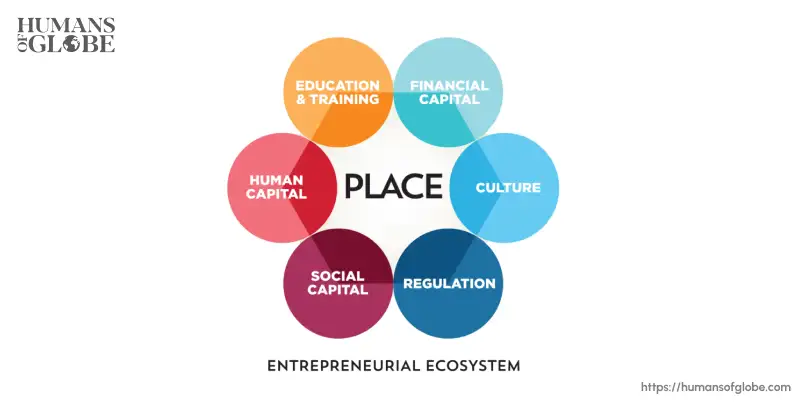What does it take to be an entrepreneur?
One would presume good ideas, hard work, perhaps some luck? There must be more to that.
Building a business is always a gamble. There is an immense risk of failure, and when the failure comes, it’s hard-hitting.
Anyone trying to build a business must require strength, faith, and trust in themselves while being prepared for failure.
It is not far-fetched to assume that communities and surroundings that instill this self-confidence in young entrepreneurs must cultivate more businesses within the entrepreneurial ecosystem.
Societies that are more tolerant of failures don’t tend to instill fear or anxiety surrounding failure. This means more people attempt to start something new.
Moreover, no business can start without access to the appropriate resources. Most, if not all, businesses require large amounts of capital. In societies, this translates to access to loans, enthusiastic investors, and investment companies.
While it’s agreeable that businesses impact society, simultaneously, societies or social environments also largely contribute to business development.
An entrepreneurial ecosystem comprises the elements of society that form a support system for new entrepreneurs. This includes people who are part of that community, like investors or educators, as well as institutions like governments or other businesses.
Around 5.5 million new businesses were started in 2023 alone. The record number only indicates the need and importance of a sustainable support system for budding entrepreneurs.
In this article, we’ll be diving into the elements of a healthy entrepreneurial ecosystem and how to cultivate them.

Understanding Entrepreneurial Ecosystems
An entrepreneurial ecosystem is the union of various components that impact the formation and trajectory of startups within a region.
At its core are the entrepreneurs themselves, along with the talent, ideas, services, and capital they require. However, the ecosystem stretches far beyond, encompassing the policies, markets, culture, investment climate, and support organizations surrounding them.
These elements are all intricately interconnected, functioning as a cohesive system. A weakness in one area compromises the entire environment’s ability to create and sustain new businesses over time.
This is why a myopic, fragmented approach falls short—nurturing an ecosystem requires a holistic perspective.
Model entrepreneurial hubs like Silicon Valley, Tel Aviv, and Berlin didn’t arise by chance.
Their vibrancy stems from coordinated efforts across all these spheres, creating self-perpetuating cycles that continually attract top talent, funding, and innovation.
Fostering the Right Culture and Talent Pipeline
At the heart of every thriving startup community is a culture that celebrates entrepreneurial thinking and risk-taking. An environment where innovative ideas are not just welcomed but actively encouraged to take root and blossom.
This mindset shift begins by embedding entrepreneurial skills and attitudes early through education and training programs.
Universities play a key role here, offering hands-on entrepreneurship courses, investing in cross-disciplinary initiatives, and fostering ties between students and the local startup scene.
Extracurriculars like entrepreneurship clubs, pitching competitions, and self-starting projects are equally vital for developing an entrepreneurial spirit from the ground up.
However, these mindsets won’t proliferate if the talented individuals embodying them continually depart for more lucrative opportunities elsewhere.
Retaining this entrepreneurial human capital requires a competitive incentive structure and a high quality of life that makes the ecosystem an attractive place to plant roots long-term.
One shining example is Boulder, Colorado – home to a virtuous cycle of entrepreneurial activity thanks to its talent density, culture, and quality of life factors.
The University of Colorado catalyzes this by generating a steady pipeline of entrepreneurially-minded graduates, many of whom stay to launch businesses.
Coupled with an enviable work-life balance buoyed by the outdoor recreation scene, it’s an ecosystem set up for sustainable success.
Creating Robust Support Networks
Even with the right talent and culture, entrepreneurs face immense hurdles when striking out on their own.
This is where robust support networks and services become vital for enabling their journeys and improving the odds of survival.
Incubators, accelerators, co-working spaces, and maker facilities all play crucial roles – providing physical infrastructures, services like legal/accounting assistance, advisory mentorship, and opportunities to connect with fellow entrepreneurs.
Beyond just affordable resources, these hubs help facilitate the cross-pollination of ideas and knowledge sharing that spurs innovation.
Support organizations should also bridge connections between startups and investors, corporate partners, suppliers, and other key players within the ecosystem.
Curating these relationships and facilitating productive collisions is paramount for fueling startups’ growth.
Ultimately, what entrepreneurs need most is a strong community surrounding them with a vested interest in their success. One compelling example is Techstars, a renowned accelerator program operating across the globe.
Its localized, founder-focused model not only provides mentorship and seed funding, but fosters deeply interconnected communities of entrepreneurs, for investors, experts, and alumni.
Optimizing the Policy and Funding Environment
While talent and support structures are crucial, the proliferation of entrepreneurship rises and falls based on policies and access to capital.
The most fertile ecosystems implement regulatory frameworks that actively enable startups to get off the ground and propel new business formation.
This could include tax incentives like credits for angel investors, low corporate tax rates, or grants providing non-dilutive seed funding.
Policymakers can also reduce regulatory burdens faced by startups through mechanisms like temporary visa programs for entrepreneurs or “regulatory sandboxes” that waive certain operational requirements in sectors like fintech.
Improving startups’ access to various capital sources at each stage is also pivotal. Well-designed tax policies can incentivize investment funds and angel groups to deploy capital to new businesses.
Universities and corporations are increasingly introducing venture capital arms to back affiliated entrepreneurs and strategically align with emerging innovations.
And of course, government funding plays a vital role in sponsoring research, backing high-risk “moonshot” projects, and supporting small business grant programs.
One recent success story is France, which has risen as a new startup powerhouse through immigrant-friendly tech visas, heavy R&D investment, and tax credits, and over €7 billion in public funds fueling its AI and deep tech ecosystems.
Ultimately, no entrepreneurial ecosystem can thrive without sufficient capital continually flowing to fuel new ideas at every stage of its lifecycle.
- High-growth startups under 5 years old created around 2.8 million jobs in 2019, compared to 1.8 million from older firms.
- Emerging entrepreneurial ecosystem hubs are cropping up globally in cities like Lagos, Nairobi, Medellin, and Ho Chi Minh City, driven largely by urbanization and tech democratization.
- New virtual entrepreneurial ecosystems are also taking shape around niche sectors like crypto, facilitated by remote collaboration tools.
- Diversity remains an ongoing challenge, with underrepresented founders often facing far greater barriers in accessing capital, networks, and other ecosystem resources.
- Some initiatives boosting inclusion include targeted accelerators/venture funds, regulatory reforms like DACA/HB-1 work visas, representation initiatives, and more.
Concluding the Entrepreneurial Ecosystem
Like discussed in the article above, for an ecosystem to thrive, it must cultivate its components and develop healthy relationships.
From the people who work within the ecosystem, like loan providers, managers, coworkers, and other entrepreneurs, to institutions, like government bodies, educational systems, and banks; all components must work in harmony.
When it comes to individuals in society, it is important to nurture an open mind. New start-ups mean new ideas, often unfamiliar. Attempting to view all perspectives helps provide creative liberties for new businesses to grow.
An open mind also helps cultivate the components of the ecosystem. Considering viewpoints from different backgrounds and points of view enables healthy coordination.
Building a holistic approach within businesses ensures that every department in the organization works in a team. Maintaining a shared vision and respect empowers people and encourages new perspectives.
We are entering an entrepreneurial ecosystem revolution. The digital revolution and access to an enormous volume of information have transformed the business landscape.
The modern society has also evolved in a manner that provides nourishing support to newcomers.
Businesses impact society, and society impacts businesses. Judging by the number of new start-ups and societal patterns, it is safe to say the world is moving in the right direction.
Being an individual in a community, it serves well to be educated and literate about the impact you can have on the world.
We hope this article provides you with that insight.





